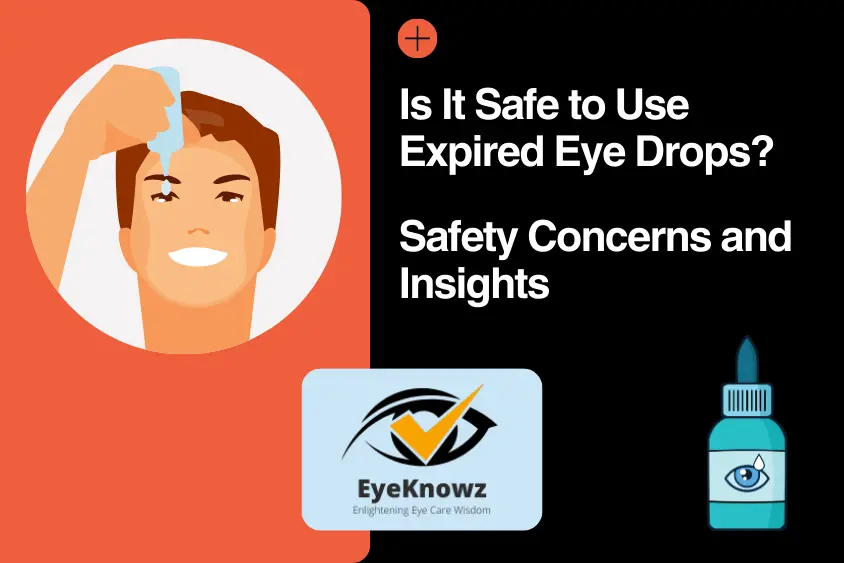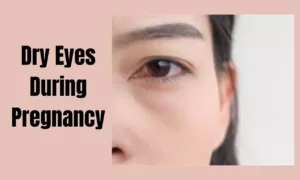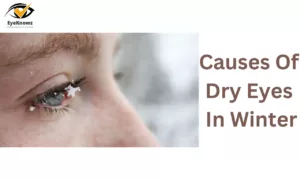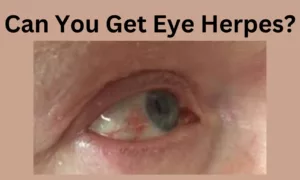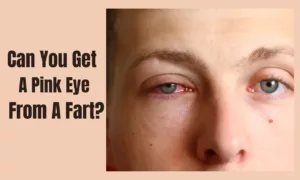Is it safe to use expired eye drops? Get insights on the safety of expired eye drops and potential risks to ensure eye care with the best possible precautions.
Eye Drops:
There are many medical conditions of the eyes that can be treated with eye drops. Some eye drops treat infections with antibiotics, while others relieve dry eye symptoms or regulate eye pressure. Eye drops can effectively relieve pain, discomfort and fight infections when used correctly. Eye drops can provide moisture, treat inflammation, and serve a variety of other purposes.
Even though eye drops have many benefits, Can you use expired eye drops? Even over-the-counter (OTC) eye drops should be used appropriately by paying attention to expiration dates. Some require a prescription. We sometimes forget when our over-the-counter eye drops or prescription eye drops were last purchased. Find out if you can use an expired eye drop bottle or how to use them safely.
Some Uses for Eye Drops:
Eye drops are used by almost everyone at some point in their lives. It is often a temporary requirement, such as during allergy season. Depending on your needs, symptoms, and health condition, an eye doctor may prescribe a better eye drop at other times.
In most cases, eye drops are used for the following reasons:
- Eye dryness
- Allergic reactions to the eyes
- Pink eye
- Rewetting contact lenses
- Glaucoma
- Eye Moisture
- Acute and chronic eye infections
- Before and after surgery
- Inflammation control
Using expired eye drops:
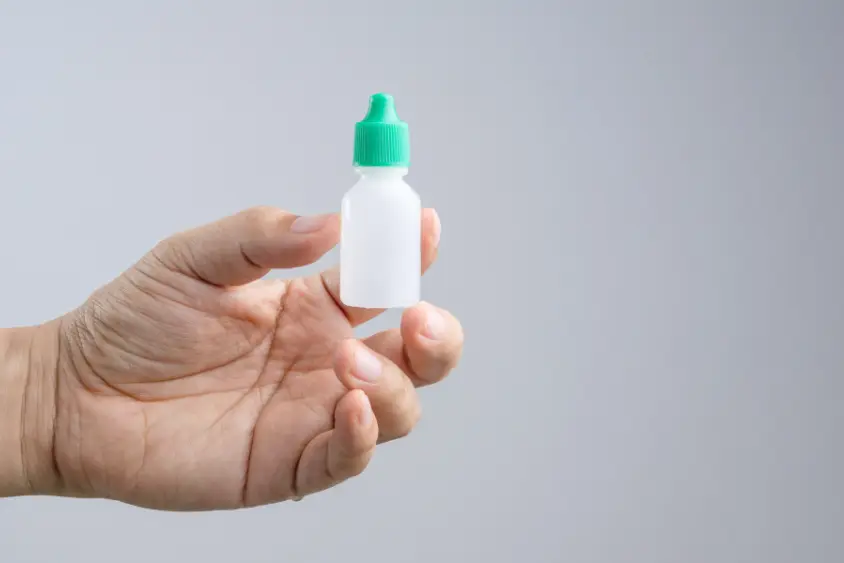
In general, eye drops are safe to use after they expire, but you shouldn’t use them after they expire. It is recommended to store and use eye drops correctly so that they will remain safe until their expiration date. Then they lose their effectiveness, and contamination may occur. However, you shouldn’t use anything medicinal after it’s expired.
The preservatives in eye drops may break down over time and leave them contaminated with bacteria. Moreover, many eye drops contain preservatives that prevent bacteria from growing.
When your eye drops are expiring, make sure you replace them with something more effective. Be sure to check the expiration date of your eye drops, whether they are prescription or over-the-counter.
What causes eye drops to expire?
Eye drops that are outdated or expired can severely affect your vision, yet many of us don’t bother to check the eye drop expiration date. Manufacturers determine the expiration date for eye drops based on stability testing. In addition to the ingredients used, preservation methods determine the shelf life of eye drops. The purpose of preservatives in eye drops is to ensure that they are safe and effective.
As the preservatives break down, the medication becomes more susceptible to bacterial growth. The time frame varies because various drops contain different preservatives that last for different amounts of time. The air may contribute to the breakdown of preservatives upon opening the containers. Because of this, some manufacturers give a second expiry date. The effectiveness and safety of eye drops may deteriorate after the eye drops expiration dates.
Tips for properly using eye drops:
If you apply eye drops properly, they can be both effective and safe for your eyes. Eye drops have many benefits and uses but must be used carefully. There is a risk of contamination with bacteria, which can result in eye infections. All eye drops should be used safely. To get the best results from eye drops, follow these tips:
- Before using eye drops, ensure that your hands are clean and sanitized.
- Use your index finger to gently pull down the skin below your eye as you tilt your head back.
- The dropper should be placed above your eye as you look up. Fill the pocket made by your lower eyelid with one drop.
- Keep the dropper clean and avoid touching your eyes, eyelids, or other surfaces.
- Your dropper should be replaced if it contacts the ground or another area-this will cause it to become contaminated and cause an eye infection.
- When using eye drops, be sure to follow the directions, including how often and how long to use them.
- Make sure you put the right amount of drops in your eye. Excessive use of eye drops may cause irritation and other side effects.
- Once you’ve applied the drops, close your eye gently and leave them closed for a few seconds to allow them to absorb.
Consult your optometrist:
Is it safe to use expired eye drops? The eye drops should be safe to use until the expiration date, but to avoid expired medicine side effects, you should follow the advice of your eye doctor. Depending on their type, there may be specific instructions for using and storing eye drops. There are some drops that need to be kept at room temperature and others that need to be refrigerated. It is possible to have preservative- or preservative-free eye drops if artificial tears are used.
Be careful when using eye drops without preservatives since they don’t have additives to fight bacteria. The effectiveness of eye drops depends on their safety of use and sterility. In case you’re unsure about the expiration date of your eye drops, make sure you avoid contact with the dropper. Infections can result from contaminated droppers.
Eye Drop Precautions:
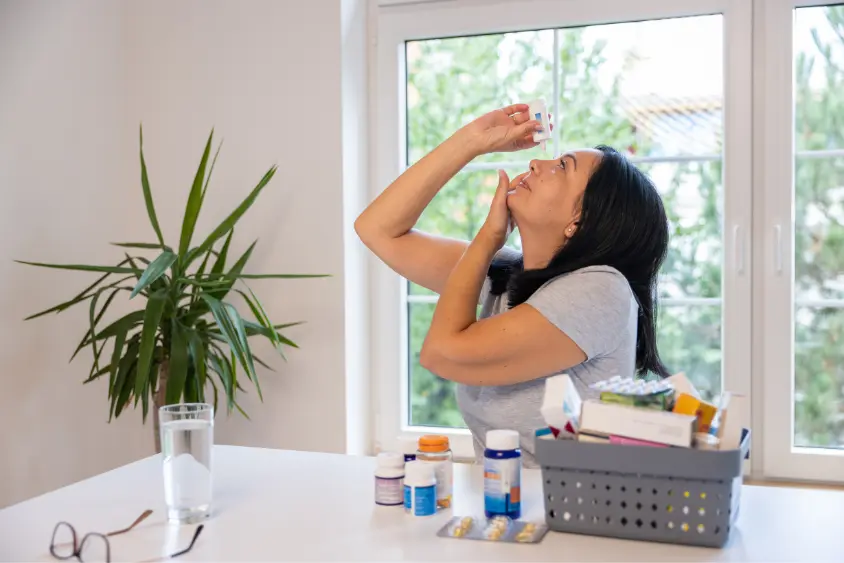
- Wearing contact lenses while using eye drops is not recommended. If your eye doctor believes they are safe to use, you can use them. Make sure you follow the instructions provided by your optometrist when using your eye drops.
- Avoid sharing eye drops with others to avoid infection. It may seem convenient to give someone your eye drops to hydrate their eyes, but it is a potential source of infection. Using eye drops contaminated by someone may result in irritated eyes. Keeping eye drops for yourself is the best way to prevent an infection.
Effective storage of eye drops:
How long do eye drops last before they expire? The shelf life of unopened eye drops is generally 1-2 years after their manufacturing date. Eye drops usually contain preservatives to help them stay safe after they are opened. However, you should dispose of unused eye drops 30 days after opening the bottle.
Expired eye drops should never be used. If you use expired eye drops, you may suffer from irritation, inflammation, and infection. Eye drops can be kept fresh and effective for longer if they are stored correctly. Be sure to:
Avoid direct exposure to the sun:
Sun exposure can harm your eye drops. The solution can become overheated and lose its chemical properties if exposed to too much sunlight.
Seal them tightly:
It is very important that you seal the bottle tightly at all times in order to prevent contamination and evaporation of the solution.
Store your eye drops in a cool, dry place:
Eye drops should be stored at room temperature or in a cool, dark place. Hot or humid environments may cause them to become damaged more quickly.
To sum up:
Eye drops can be helpful in managing eye irritation. However, your overall eye health is also essential. Eye drops can be helpful in many ways, but only if they work effectively. Keep your eye drops away from children, and follow your eye doctor’s advice.
FAQs:
Do eye drops expire?
Yes, eye drops do have an expiration date. Make sure to check the expiration date on the packaging before using it.
Is it safe to use expired eye drops?
Expired eye drops should not be used. As the chemical composition of the drops changes over time, they may be less effective or potentially harmful. Replace expired eye drops with fresh, unexpired ones to ensure optimal results.
How long do antibiotics last before they expire?
In general, antibiotics have a shelf life of around one to three years after manufacturing. You must adhere to the expiration date in order to ensure that they remain effective.
What are the side effects of expired eye drops?
Using expired eye drops can lead to potential side effects such as irritation, burning sensations, blurred vision, or even infections. It’s best to avoid using them beyond their expiration date.

